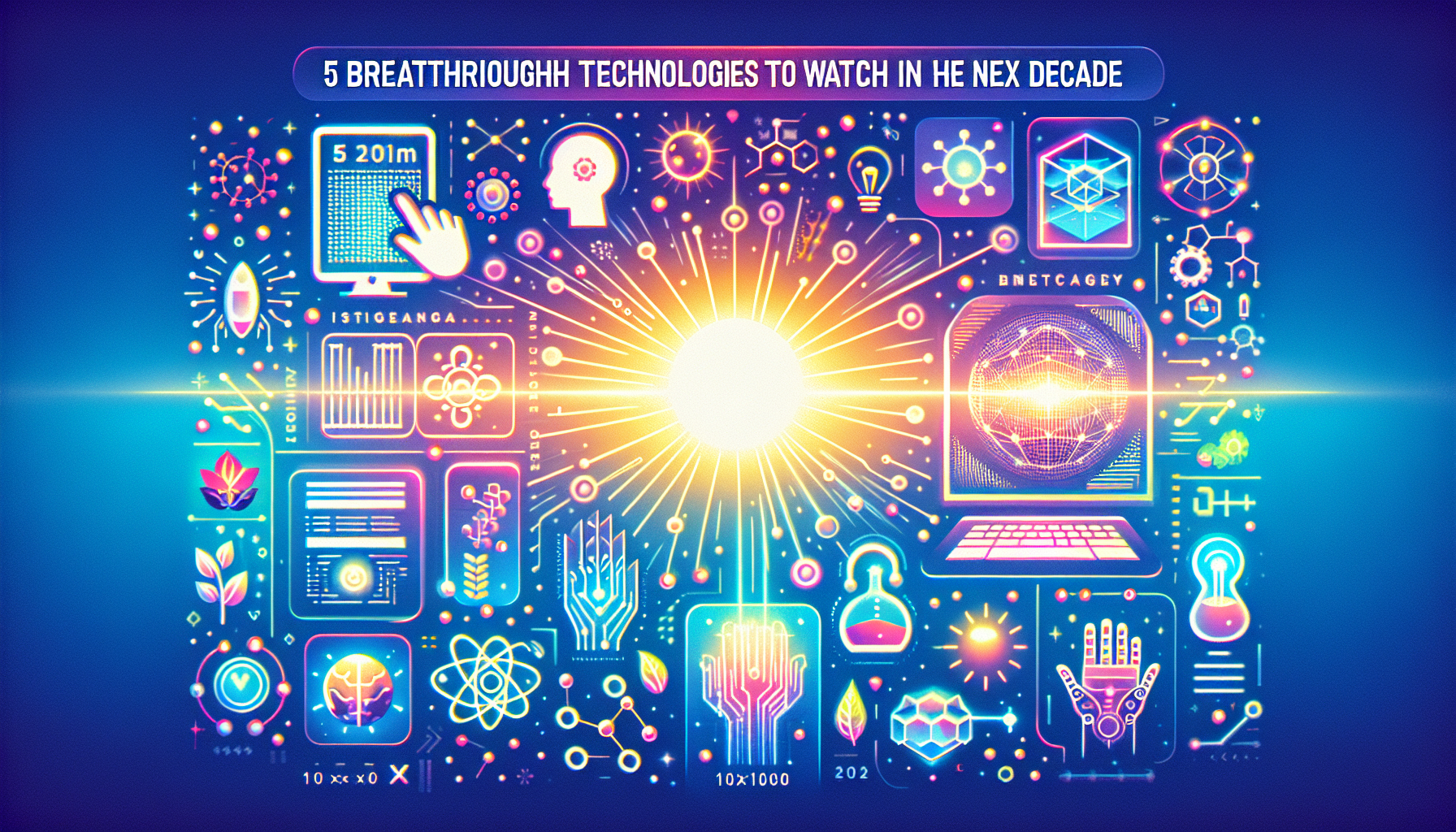As we stand on the brink of a new decade, the pace of technological advancement is accelerating at an unprecedented rate. Innovations that once seemed like science fiction are now becoming an integral part of our daily lives. With this rapid transformation, it’s essential to keep an eye on the breakthrough technologies that are poised to reshape industries, economies, and societies in the next ten years. In this blog, we will explore five groundbreaking technologies that have the potential to revolutionize our world.
1. Artificial Intelligence (AI) and Machine Learning
The Evolution of AI
Artificial Intelligence (AI) has already made significant inroads in various sectors, from healthcare to finance. However, the next decade will see even more sophisticated applications of AI and machine learning (ML). Advances in deep learning, natural language processing, and computer vision are paving the way for AI systems that can perform complex tasks, learn from minimal data, and provide personalized experiences.
Real-World Implications
– Healthcare: AI will enhance diagnostics, predict patient outcomes, and even assist in surgical procedures.
– Finance: Machine learning algorithms will refine fraud detection, automate trading, and personalize investment strategies.
– Transportation: Autonomous vehicles will become safer and more efficient, thanks to AI systems that learn from real-time data.
2. Quantum Computing
Understanding Quantum Computing
Quantum computing is set to revolutionize the way we process information. Unlike classical computers, which use bits to represent either 0 or 1, quantum computers use qubits, allowing them to perform complex calculations at unprecedented speeds. This leap in computational power could unlock solutions to problems that are currently unsolvable.
Potential Impact
– Drug Discovery: Quantum computers will enable researchers to simulate molecular interactions at an atomic level, significantly speeding up the drug discovery process.
– Cryptography: Quantum computing could challenge current encryption methods, necessitating the development of new security protocols.
– Optimization Problems: Industries ranging from logistics to finance will benefit from more efficient optimization algorithms, leading to cost savings and improved performance.
3. Biotechnology and CRISPR
The Rise of Biotechnology
Biotechnology has made remarkable strides over the past few years, particularly in the field of genetic engineering. CRISPR (Clustered Regularly Interspaced Short Palindromic Repeats) technology allows for precise modifications to DNA, opening up new possibilities in medicine, agriculture, and environmental science.
Transformative Applications
– Genetic Diseases: CRISPR technology holds the potential to cure genetic disorders by correcting mutations at the source.
– Agricultural Innovation: Genetically modified crops can be engineered for better yield, pest resistance, and climate adaptability, addressing food security challenges.
– Environmental Solutions: Biotechnology can contribute to environmental conservation efforts, such as bio-remediation of polluted sites and the development of biodegradable materials.
4. Renewable Energy and Energy Storage
The Shift Towards Sustainability
With the growing urgency to combat climate change, renewable energy technologies are becoming more viable and efficient. Solar, wind, and hydroelectric power are leading the charge, but the next decade will also see significant advancements in energy storage solutions that are crucial for the widespread adoption of renewable energy.
Key Developments
– Battery Technology: Innovations in lithium-sulfur and solid-state batteries could lead to higher energy densities and faster charging times, making electric vehicles (EVs) more practical and appealing.
– Smart Grids: The integration of AI and IoT with energy grids will improve efficiency, reduce waste, and enable real-time energy management.
– Hydrogen Fuel Cells: As a clean energy source, hydrogen fuel cells are poised to play a significant role in decarbonizing industries and transportation.
5. The Metaverse and Virtual Reality (VR)
The Emergence of the Metaverse
The concept of the metaverse—a collective virtual shared space created by the convergence of virtually enhanced physical reality and physically persistent virtual reality—is gaining traction. As technology advances, the metaverse will become more immersive and accessible.
Future Possibilities
– Entertainment and Gaming: The metaverse will redefine social interaction and entertainment, offering users a fully immersive experience that blurs the lines between reality and virtuality.
– Work and Collaboration: Virtual offices in the metaverse will enable remote teams to collaborate seamlessly, making it easier to connect regardless of physical location.
– Education and Training: VR and AR technologies will transform education, providing interactive and engaging learning environments that cater to diverse learning styles.
Conclusion
The next decade promises to be a thrilling era of technological innovation. From the transformative power of AI and quantum computing to the potential of biotechnology and renewable energy, we are on the cusp of breakthroughs that will redefine our world. As we navigate these changes, it is crucial to consider the ethical implications and societal impacts of these technologies. By staying informed and engaged, we can harness these advancements for the greater good, ensuring a brighter and more sustainable future. The future is now, and it is filled with possibilities.

Leave a Reply